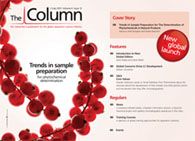Capillary chromatography awards
PerkinElmer has recognized two of the world?s leading researchers in capillary chromatography at the 34th International Symposium on Capillary Chromatography in Riva Del Garda, Italy.
PerkinElmer has recognized two of the world’s leading researchers in capillary chromatography at the 34th International Symposium on Capillary Chromatography in Riva Del Garda, Italy. “Recognizing the work of accomplished chromatographers and young leaders in the field is important in ensuring that we encourage new developments in capillary chromatography,” said Eric Ziegler, vice president of the company’s chromatography business unit. “We must continue to work closely with our fellow scientists in academia to partner on solutions that meet the needs of both industry and academia.”
The Marcel Golay award was instituted in 1989 in honour of Marcel Jules Eduard Golay, the inventor of capillary columns. This year the award went to Professor Janusz Pawliszyn of the University of Waterloo, Ontario, Canada, for a lifetime of achievement in capillary chromatography, most notably his development of solid-phase microextraction.
Established in 2008 in honour of the late Leslie S. Ettre, who made major contributions to the field of gas chromatography, the Leslie Ettre award is presented to a scientist 35 years old or younger who presented the most interesting original research in capillary gas chromatography. The award was presented to Dr Giorgia Pucaro of the University of Messina, Italy for her work in the qualification and quantification in comprehensive two-dimensional gas chromatography linked to quadruple mass spectrometry.
For more information on the company visit www.perkinelmer.com
This story originally appeared in The Column. Click here to view that issue.
Regulatory Deadlines and Supply Chain Challenges Take Center Stage in Nitrosamine Discussion
April 10th 2025During an LCGC International peer exchange, Aloka Srinivasan, Mayank Bhanti, and Amber Burch discussed the regulatory deadlines and supply chain challenges that come with nitrosamine analysis.












